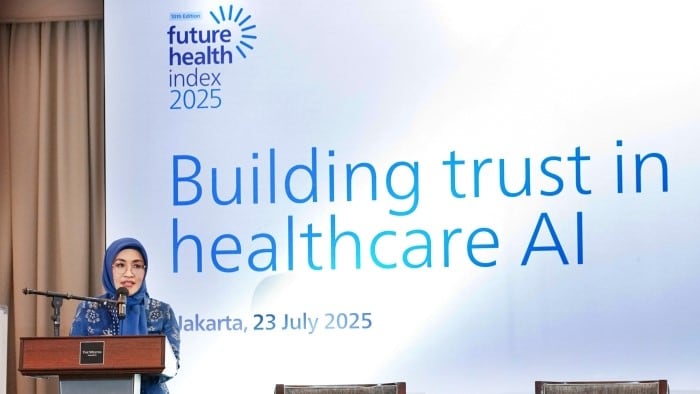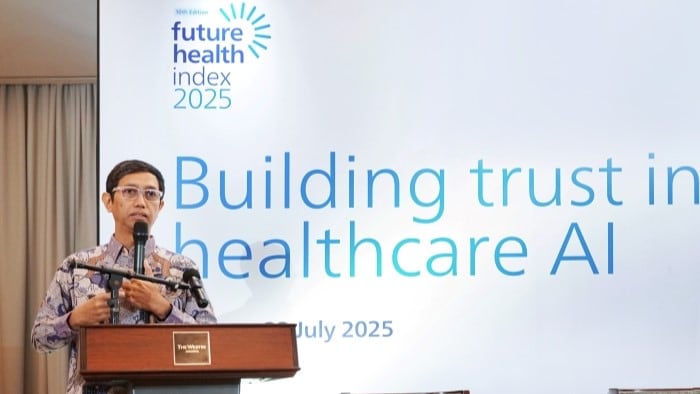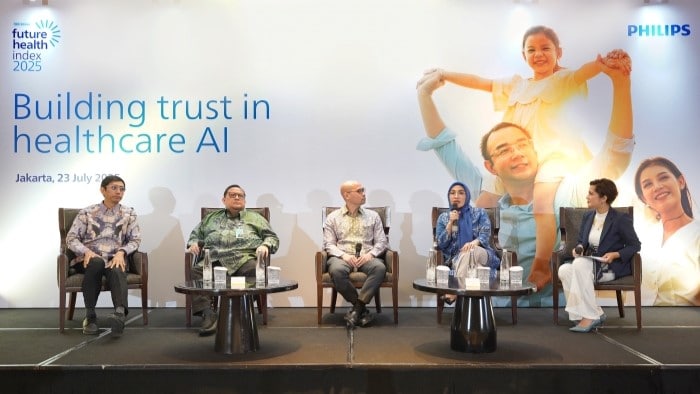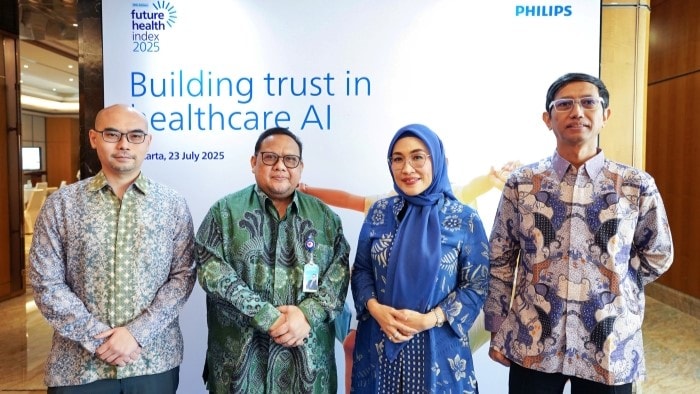Jul 23, 2025
AI in Healthcare: Philips Future Health Index Report highlights urgent need to build trust and enable effective implementation in Indonesia
Philips Future Health Index 2025 reveals strong optimism around artificial intelligence in Indonesian healthcare — but trust, transparency, and thoughtful design remain key to unlocking its full potential.

Jakarta, Indonesia – Royal Philips (NYSE: PHG, AEX: PHIA), a global leader in health technology, today released the Indonesia findings from its 10th annual Future Health Index (FHI) report — the largest survey of its kind. Drawing insights from healthcare professionals and patients across 16 countries, including Indonesia and others in the Asia-Pacific (APAC) region, the report explores how artificial intelligence (AI) and digital innovation can help improve access to care, outcomes, and healthcare system resilience.
As Indonesia accelerates its nation’s digital health transformation, the findings position the country among the world’s most optimistic about AI’s role in healthcare. Yet alongside that optimism, the findings underscore the importance of trust, education, and inclusive design to ensure successful and equitable implementation.
To unlock that potential, we must design with empathy, build trust, and ensure responsible implementation that truly serves the needs of both patients and healthcare professionals.”
Astri Ramayanti Dharmawan
President Director, Philips Indonesia

Astri Ramayanti Dharmawan, President Director of Philips Indonesia, presenting key findings from the Philips Future Health Index (FHI) 2025 Indonesia report during the media briefing themed “Building Trust in Healthcare AI: Bridging Innovation and Safety” in Jakarta, 23 July 2025.
“AI holds incredible promise to help improve access, shorten delays, and relieve pressure on healthcare professionals,” said Astri Ramayanti Dharmawan, President Director of Philips Indonesia. “To unlock that potential, we must design with empathy, build trust, and ensure responsible implementation that truly serves the needs of both patients and healthcare professionals.”
Mounting pressure on Indonesia’s healthcare system

The system continues to face growing demand and shortfall in medical specialists. While Indonesia produces just 2,700 new specialists each year, estimates suggest a national need of 29,000 [1]. The effects of this imbalance are clear: 77% of patients report long waits to see a specialist, and one in three (33%) experience delays even for general care. More critically, 51% say their health deteriorated because they couldn’t access timely care, and 45% were hospitalized as a result.
AI seen as a key enabler, but gaps remain

Setiaji, S.T., M.Si, Expert Staff for Health Technology and Chair of the Health Technology and Digital Transformation Team (TTDK) at the Ministry of Health of the Republic of Indonesia, delivering his keynote speech highlighting the Indonesian government's commitment to building a reliable and resilient digital health ecosystem to support the delivery of integrated and high-quality healthcare services across the country.
Despite these strains, both healthcare professionals and patients in Indonesia express strong confidence in AI’s potential to improve care delivery. This optimism outpaces APAC and global averages. According to the survey, 84% of healthcare professionals and 74% of patients AI could improve care. Among them, 85% of healthcare professionals say AI-powered predictive analytics could help save lives by enabling earlier interventions, and 73% believe digital tools will reduce hospitalizations in the future.
However, the report also identifies ongoing workflow challenges. More than half (56%) report spending less time with patients and more time on administrative tasks compared to five years ago. 62% of healthcare professionals also say they lose clinical time due to fragmented or inaccessible dataFor a fifth (18%), this amounts to over 45 minutes lost per shift, adding up to nearly a full month (23 working days) of clinical time lost per year.
Without meaningful adoption of AI, 57% of healthcare professionals anticipate worsening patient backlogs, 49% foresee missed opportunities for early intervention, and 46% expect higher burnout levels.
Trust, design and education key to responsible AI adoption
The findings highlight a critical gap between technology development and day-to-day clinical realities. While 79% of healthcare professionals are involved in digital solution development, only 41% believe these tools are tailored to their actual needs.
Building trust in AI is not just a technical challenge, it’s a human one.”
Astri Ramayanti Dharmawan
President Director, Philips Indonesia

(from left to right) Setiaji, S.T., M.Si, Chief of the Digital Transformation Office, Ministry of Health; Dr. dr. Iwan Dakota, Sp.JP(K), MARS, FACC, FESC, President Director of RSJPD Harapan Kita; dr. Ben Widaja, MBChB(UK), Co-Founder & CEO of Mandaya Hospital Group; Astri Ramayanti Dharmawan, President Director of Philips Indonesia, and emcee Daniar Achri in a panel discussion on “Building Trust in Healthcare AI: Bridging Innovation and Safety.” The session explored how AI can enhance human-centered care and be scaled responsibly across Indonesia.
Top drivers of trust centre around clarity on legal liability (46%), access to reliable IT support (43%) and clear guidelines for usage (37%). Healthcare professionals are also keen to understand more about how AI is used, especially the ongoing monitoring of AI systems (35%), reassurances about data security (32%) and ensuring data bias and data quality issues are addressed (31%). Notably, only 17% cite job security as a requirement for building trust — a signal that most healthcare professionals view AI as an enabler, when appropriate safeguards are in place.
Patients want faster, better-connected care and trusted guidance

From the patient perspective, concerns centre around communication and outcomes. While 82% say they support more technology in healthcare if it improves care, 54% are worried that it will reduce face-to-face interaction with their doctors. Data privacy is a key concern with 38% of patients saying that knowing their information would be kept safe is essential to being more comfortable with AI. The fact that this holds true for those with higher familiarity with AI (42%) suggests that deeper understanding doesn’t always ease anxiety.
Patients in Indonesia are also turning to new sources of health information. Whilst they still trust healthcare professionals the most when it comes to receiving information about AI, 82% say they would feel more comfortable with its use if they heard about it on social media. This highlights the growing influence of platforms like Instagram and TikTok, as well as the role healthcare professionals play in shaping trusted digital spaces. This signals a growing need to ensure information integrity, especially in remote areas, and to support clinicians as trusted intermediaries for AI adoption.
The way forward: scaling AI innovation responsibly

(from left to right) dr. Ben Widaja, MBChB(UK), Co-Founder & CEO of Mandaya Hospital Group; Dr. dr. Iwan Dakota, Sp.JP(K), MARS, FACC, FESC, President Director of RSJPD Harapan Kita; Astri Ramayanti Dharmawan, President Director of Philips Indonesia; and Setiaji, S.T., M.Si, Chief of the Digital Transformation Office, Ministry of Health, at the FHI 2025 Indonesia media briefing in Jakarta.
Indonesia is well-positioned to lead in AI-enabled healthcare. With near-universal health coverage under JKN and strong government commitment through the Ministry of Health’s digital health transformation roadmap, the foundations are in place. What’s needed now is to align innovation with human needs — and deliver solutions that are inclusive, and effective at scale with strong safeguards
“Building trust in AI is not just a technical challenge, it’s a human one,” concluded Astri.“By pairing innovation with transparency, people-centred design, deep cross-sector partnerships and clear regulatory guardrails, we can build a smarter, more resilient healthcare system — and deliver better care for more people.”
With the right safeguards and partnerships, the future of AI in Indonesia is promising — and well within reach.
For details on the Future Health Index methodology and to access the full Future Health Index 2025 report, visit Future Health Index | Philips.
Tentang Royal Philips
Royal Philips (NYSE: PHG, AEX: PHIA) is a leading health technology company focused on improving people’s health and well-being through meaningful innovation. Philips’ patient- and people-centric innovation leverages advanced technology and deep clinical and consumer insights to deliver personal health solutions for consumers and professional health solutions for healthcare providers and their patients in the hospital and the home.
Headquartered in the Netherlands, the company is a leader in diagnostic imaging, ultrasound, image-guided therapy, monitoring and enterprise informatics, as well as in personal health. Philips generated 2024 sales of EUR 18 billion and employs approximately 67,800 employees with sales and services in more than 100 countries. News about Philips can be found at www.philips.com/newscenter.







